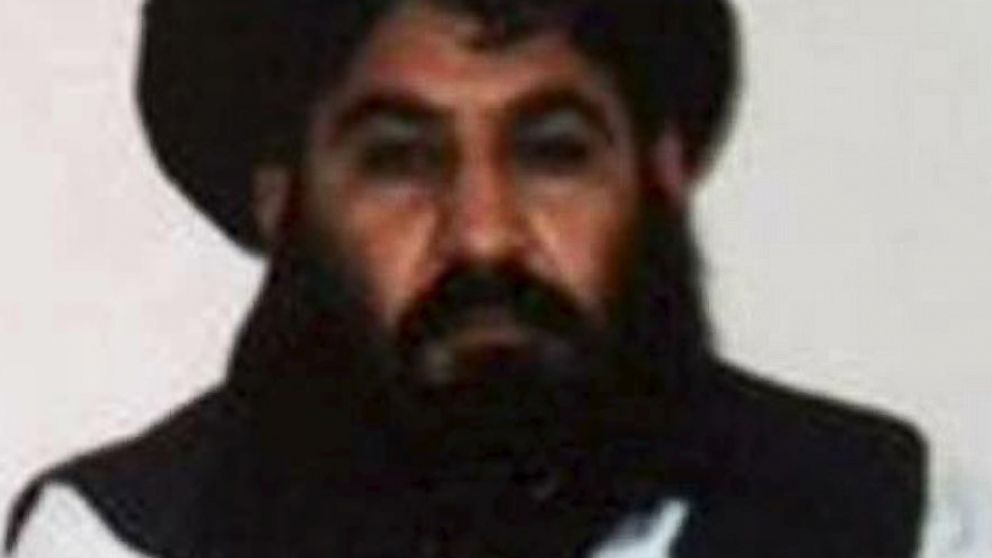Taliban Leader Mullah Akhtar Mansur Killed in U.S. Airstrike, Say Afghan and Taliban Officials
"Mansur posed a continuing, imminent threat to U.S. personnel," said John Kerry.

— -- Editor’s Note: An earlier version of this story reported an incorrect location for the airstrike that authorities say killed Mullah Akhtar Muhammad Mansour. The strike occurred in Pakistan, near the border with Afghanistan.
The Pentagon says it launched an airstrike in Pakistan Saturday targeting the Taliban's overall leader, Mullah Akhtar Mansur, who was killed, according to Afghan and Taliban officials.
A U.S. official said Saturday, however, that Mansur was "likely killed" in the airstrike. Afghan intelligence confirmed Sunday to ABC News that Mansur was killed. And Senior Taliban commander Mullah Abdul Rauf also told The Associated Press Sunday that Mansur had been killed in the airstrike.
While in Myanmar Sunday, U.S. Secretary of State John Kerry, addressed the strike on the Taliban leader, repeatedly referred to Mansour in the past tense.
"Yesterday, the Unites States conducted a precision airstrike that targeted Taliban leader Mullah Mansour in a remote area of the Afghanistan-Pakistan border region," Kerry told reporters. "Mansour posed a continuing, imminent threat to U.S. personnel in Afghanistan, to afghan civilians, Afghan security forces and resolute support coalition members across the country. And this action sends a clear message to the world that we will continue to stand with our Afghan partners as they look to build a more stable, united, secure and prosperous Afghanistan."
Kerry continued, "The United States has long maintained that an Afghan-led, Afghan-owned reconciliation process is the shortest way to achieve peace and peace is what we want. Mansour was a threat to that effort and to bringing an end to the violence."
Peter Cook, the Pentagon's Press Secretary in a statement released Saturday. "Today, the Department of Defense conducted an airstrike that targeted Taliban leader Mullah Mansur in a remote area of the Afghanistan-Pakistan border region."
Cook continued, "Mansur has been the leader of the Taliban and actively involved with planning attacks against facilities in Kabul and across Afghanistan, presenting a threat to Afghan civilians and security forces, our personnel, and Coalition partners. We are still assessing the results of the strike and will provide more information as it becomes available."
A U.S. official said that although the assessment of the airstrike is ongoing, "Mansur was the target and was likely killed."
The strike was carried out at 6 a.m. ET by multiple unmanned U.S. military drones, as Mansur and another Taliban fighter drove in a vehicle in a remote area of the Afghanistan-Pakistan border, southwest of the town of Ahmad Wal, just inside Pakistan. The other adult male combatant in the vehicle was also likely killed in the airstrike that the official said did not cause any collateral damage.
The airstrike was authorized by President Obama, who was briefed before it happened and was kept updated on developments, even as he was on Air Force One flying to Vietnam to begin his visit to Asia. It was carried out by multiple unmanned drones operated by U.S. Special Operations Forces.
"Mansur has been an obstacle to peace and reconciliation between the Government of Afghanistan and the Taliban, prohibiting Taliban leaders from participating in peace talks with the Afghan government that could lead to an end to the conflict," Cook said.
"Since the death of Mullah Omar and Mansur's assumption of leadership, the Taliban have conducted many attacks that have resulted in the death of tens of thousands of Afghan civilians and Afghan security forces as well as numerous U.S. and Coalition personnel," he added.
Mansur assumed the leadership of the Taliban in July, 2015 after the group publicly disclosed that its previous leader Mullah Omar had died of natural causes in 2013 in Pakistan.
Mansur's leadership had resulted in some initial friction within the Taliban.
There are 9,800 American military service members in a training and advisory mission for Afghan troops. The majority of them stay on their bases to conduct their training, but some special operations forces still partner with their Afghan counterparts to advise them during missions.
The use of airstrikes in Afghanistan has been limited since the start of the training mission last year. Airstrikes could only be used against the Taliban if the group posed an immediate danger to Afghan or U.S. troops. In December the rules were expanded to allow the targeting of ISIS forces in Afghanistan. There was no change to the authorization of counter terrorism airstrikes against the remaining small al Qaeda presence in Afghanistan.




